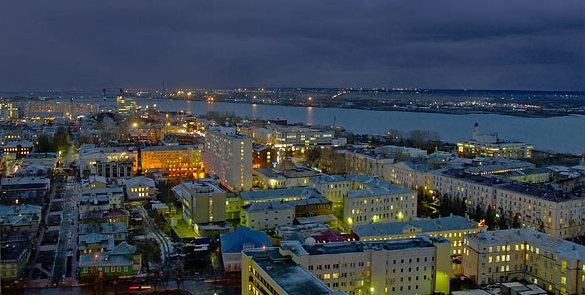
The headline at MSN is ominous:
It was 84 degrees near the Arctic Ocean this weekend as carbon dioxide hit its highest level in human history
Oh no! It’s sweltering in (or at least near) the Arctic! To emphasize the dire nature of this horrible news, the article goes on to say:
Over the weekend, the climate system sounded simultaneous alarms. Near the entrance to the Arctic Ocean in northwest Russia, the temperature surged to 84 degrees Fahrenheit (29 Celsius). Meanwhile, the concentration of carbon dioxide in the atmosphere eclipsed 415 parts per million for the first time in human history.
To the average American, who was given a very poor education in both geography and critical thinking, that sounds so bad. It shouldn’t be that warm near the Arctic Ocean, should it? Of course it should! All you have to do is look at a compilation of the weather statistics for the city being discussed (Arkhangelsk, Russia). As you can see, since 1940, the highest temperature recorded at Arkhangelsk was 93.9 F (34.4 C). During that same time period, the highest May temperature was 86.4 F (30.2 C). Both of those are higher than the “alarming” temperature being discussed in the article.
Now these results are for all years since 1940. The recent, “abnormally warm” temperatures caused by global warming are setting those records, right? Wrong. You can click on various years, and you will find that the highest temperature on record (34.4 C) occurred sometime between 1960 and 1980. As you can see, then, there is nothing unusual about it being 84 F near the Arctic Ocean at this time of year. Most people don’t know that, and most people (especially those who blindly accept what the High Priests of Science proclaim) aren’t willing to do any investigation on their own to find out.
Of course, that’s what the author of this article is counting on.

Huh. I wonder what the people of Arkhangelsk would think about that foolish MSN article. I hope they read and comment on it.
Every summer we have to go though this nonsense of the media jumping on every warm spell as a sign of doom. It’s getting old.
Over and over they keep saying that climate change is bad and must be stopped.
We need to somehow educate the world: Climate change has been going on continuously since the world began. It wasn’t caused by humans and can’t be stopped by humans. When dinosaurs roamed the earth it was a lot warmer than it is now. When glaciers covered most of North America it was a lot colder than it is now. Thank God for climate change.
It’s all about propping up a narrative that supports an agenda. And then these people get angry when we don’t believe everything they feed us.
Dr. Wile, I have been wanting to ask your opinion on carbon dioxide levels. Global temperature monitoring, as you and others have pointed out, can definitely be misleading. However, the trends for CO2 from Mauna Loa observatory and Niwot Ridge Colorado do seem to show steadily increasing levels since the mid 1950’s. Are these a better indicator, or are the increases attributable to other things?
Thanks,
Phil
The data are very clear that carbon dioxide levels are rising. Additionally, all carbon inventories that have been estimated indicate that if human-produced, non-respiratory carbon dioxide emissions dropped by roughly half, then carbon dioxide levels would not be rising. Thus, the increase is definitely human-produced.
Well then, it is simple. All those concerned to the point of loudly lamenting our imminent demise simply need to lower their breathing rate so they aren’t producing so much CO2. Wonder how much lower the levels would be if the rhetoric would stop….it has to get them all upset which only increases their respiratory rate increasing their output and contributing to the “problem”.
I kind of think it’s more likely the author just didn’t know any better; most of what we think we take on faith in the authority of experts, and this tidbit fits the sentiment of the provided paradigm. Are the rest of the data listed (record temperatures across Russia, ice breaking up early in Alaska, etc.) also typical? I wouldn’t be surprised if they are: the notions of “hottest month on record” or “earliest ice melt” aren’t inherently important, and there are countless other metrics we could construct and talk about. That we proliferate data analyses that might not matter is part of the subjectivity of science.
But if the author didn’t know any better, he is grossly incompetent. A journalist is supposed to get background information for any story. If he calls the temperature an alarm, he needs to find out the temperature ranges to see if it really is an alarm. If he did that, then he is misleading. If he didn’t do that, then he is grossly incompetent.
Sure — the author is clearly implying that all this data corroborates the story of increasing, atypical temperatures, and his opening example doesn’t. I agree that displays incompetence, though I might be more forgiving about it: we can only look out for what we’re taught to look out for, and we don’t have infinite time. I think I’d rather say that the whole of media culture is grossly incompetent for not policing itself in its climate alarmism, and this fellow partakes in it unthinkingly. Really I’m just not sure I’d say the author was “counting on” us not doing any investigation ourselves, because it’s likely he believes the narrative and doesn’t think there’s anything there to question, and thus has no sense that he’s asking us to believe easily-checked falsehoods.
Yes it is misleading journalism.
If you look at the average temperature figures over the full range available there does seem to be a warming trend but since it’s only one city it’s not particularly significant.